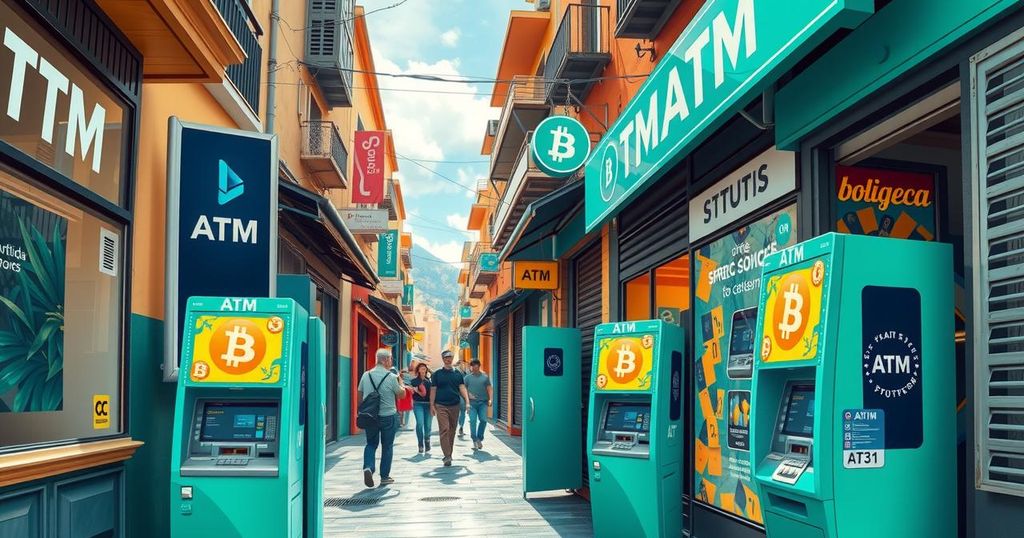Crypto Gains Foothold in Bolivia as Small Businesses Seek Currency Alternatives
- Cochabamba’s ATMs allow exchanging coins for cryptocurrencies.
- Local salons offer Bitcoin discounts to attract customers.
- Crypto transactions reportedly reached $24 million in October.
- Concerns about Bolivia’s economic crisis are prevalent among experts.
- Entrepreneurs see cryptocurrencies as a way to navigate inflation.
Bolivia Embraces Cryptocurrency Amid Economic Challenges
In the heart of Cochabamba, Bolivia, a vibrant scene is unfolding as locals are embracing cryptocurrency amid challenging economic conditions. ATMs are popping up, allowing shoppers to exchange coins for various cryptocurrencies, beauty salons are offering discounts for payments made in Bitcoin, and citizens even use their Binance accounts to indulge in fried chicken. These small steps reflect a growing acceptance of digital currency as the region grapples with a staggering economic crisis characterized by historically high inflation, dwindling dollar reserves, and fuel shortages that lead to frustratingly long lines at gas stations.
The Rise of Crypto as Economic Hedge
Bolivia’s currency, the boliviano, has been fluctuating wildly, losing over half its value on the black market this year alone due to government intervention that deceptively steadied the official rates. In response to these economic pressures, many Bolivians are looking to crypto exchanges like Binance and stablecoins such as Tether. The situation is dire; sources say that in October alone, transactions using cryptocurrencies reached around $24 million. Analysts are quick to point out this is just the tip of the iceberg, with projections indicating volumes have potentially surged since then, likening Bolivia’s remote foray into crypto to that of Argentina and Venezuela.
Businesses Adapt to Crypto Trend
However, it’s crucial to understand that while crypto is gaining traction, the market is still at a nascent stage, notably smaller than its South American neighbors. According to estimates from former central banker Jose Gabriel Espinoza, daily transactions of stablecoins are about $600,000 compared to the millions circulating in formal and black markets. In Cochabamba, the local steakhouse Bros now accepts Bitcoin through Binance, demonstrating how businesses adapt to the current situation. The restaurant’s owner, Pablo Unzueta, states plainly that the lack of dollars at banks makes utilizing Bitcoin an innovative workaround. Local salon owners like Carla Jones are also joining the crypto trend, offering discounts for crypto payments to attract younger clients, noting the potential for wealth growth amidst economic volatility.
Experts Caution on the Risks of Embracing Crypto
Despite the budding interest in Bitcoin and its friends, experts voice caution. They argue that the growth of crypto usage is a symptom, not a solution, of Bolivia’s crumbling economic situation. Dwindling domestic gas production and costly imports have led to alarming black market dollar rates. Former central bank head Espinoza claims this is not stability but rather a sign of eroded purchasing power. The risks aren’t just economic; experts warn that Bolivians could be caught in a cycle of ‘crypto-colonialism,’ a term used to describe how crypto firms target vulnerable populations to invest their limited resources into cryptocurrencies that are prone to price swings.
Community Perspectives Amid Economic Turmoil
Still, optimism circles among some locals. Take 35-year-old Andree Canelas, for instance. He’s installed crypto ATMs in various shops, convinced that cryptocurrencies present a path toward better savings. He acknowledges the risks but believes that while volatility exists in the short run, long-term potential holds more promise. As Bolivia moves into uncharted waters with cryptocurrencies, the narrative isn’t just about digital innovation but rather a reflection of a society grappling with significant economic hurdles while seeking empowerment through new technologies.
In summary, Bolivia’s small businesses are increasingly adopting cryptocurrencies like Bitcoin and stablecoins such as Tether as alternatives to the boliviano, which has lost significant value amid a crippling economic crisis. The country is experiencing a unique crypto movement fueled by necessity, but caution must be exercised as experts raise concerns about the implications of this shift. Overall, while digital currencies offer a glimpse of hope in dire times, they also underscore Bolivia’s ongoing economic struggle. As the situation unfolds, the country stands at a crossroads between innovation and caution in the face of uncertainty.




Post Comment